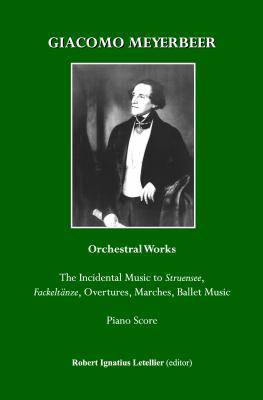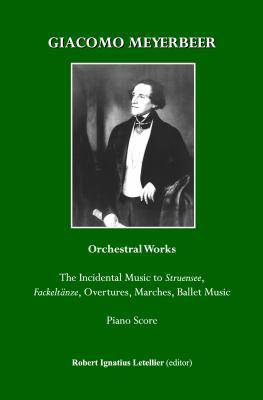
- Retrait gratuit dans votre magasin Club
- 7.000.000 titres dans notre catalogue
- Payer en toute sécurité
- Toujours un magasin près de chez vous
- Retrait gratuit dans votre magasin Club
- 7.000.0000 titres dans notre catalogue
- Payer en toute sécurité
- Toujours un magasin près de chez vous
Giacomo Meyerbeer Orchestral Works: The Incidental Music to Struensee, Fackeltänze, Overtures, Marches, Ballet Music Piano Score
Robert Ignatius Letellier
Livre broché | Anglais
115,45 €
+ 230 points
Description
This volume brings together a collection of the orchestral works of the composer Giacomo Meyerbeer. He is remembered as one of the great figures of 19th-century opera-a master of brilliant vocalism, impassioned drama and vivid orchestral power and colour. His operas are noted for their precise construction and urgent propulsion, and never linger for long in music for its own sake. Nevertheless, the orchestral passages are integral to the dramatic logic: brief thematically pertinent preludes and precise introductions to the individual acts, always providing a sense of colour and purpose. The operas are also famous for their ballets as an integral aspect of the dramaturgy of the grand French style, but even here the music is kept within strict temporal control. Some of these dance sequences (like the Ballet of the Nuns in Robert le Diable and the Skaters' Ballet in Le Prophete became very famous in themselves: the former was of seminal influence on the development of the Romantic Ballet, both in musical and conceptual terms; the latter is known universally as the ballet of winter joy, Les Patineurs). Other orchestral episodes from the operas also enjoyed great independent popularity-like the resplendent Coronation March in Le Prophete and the exotic Marche Indienne in L'Africaine. The former continues to be Meyerbeer's most widely known composition. All these works have been gathered together in this volume to constitute orchestral suites from the French operas-both grand and the smaller operas comiques. The two latter works L'Etoile du Nord and Dinorah each has an extended overture. Meyerbeer's most substantial orchestral work, however, is the incidental music he wrote for his brother, Michael Beer's tragedy Struensee (1846). The overture is Meyerbeer's crowing achievement in orchestral writing, and the rest of the incidental music is enthralling in its drama, passion and pathos. The composer was also asked to write instrumental music for other public occasions, most especially for the weddings of the Prussian Royal Family. He provided four stirring Fackeltanze for the torchlight procession held at the Hohenzollern nuptial celebrations, superb works in processional polonaise style, full of grandezza, dramatic gesture and affecting lyricism. In 1861 Meyerbeer was asked to compose the music for the royal procession of King Wilhelm I of Prussia at the ancient capital of Konigsberg. The result was another Coronation March, this one of more formal and stately character, that reaches its climax most appropriately in the Prussian national anthem Ich bin ein Preusser. In 1862 Meyerbeer was commissioned to write music for the opening of the London Exhibition in the Crystal Palace. His Overture in March Style is in the form of a Baroque suite, and provides a series of four variants on the march genre, culminating in a fantasia on Rule Britannia. This grandiose festive piece is full variety, surprises and subtle orchestral colours. Like all this composer's work, this fine composition is waiting to be rediscovered.
Spécifications
Parties prenantes
- Auteur(s) :
- Editeur:
Contenu
- Nombre de pages :
- 260
- Langue:
- Anglais
Caractéristiques
- EAN:
- 9781443809795
- Date de parution :
- 01-07-09
- Format:
- Livre broché
- Format numérique:
- Trade paperback (VS)
- Poids :
- 276 g

Les avis
Nous publions uniquement les avis qui respectent les conditions requises. Consultez nos conditions pour les avis.






